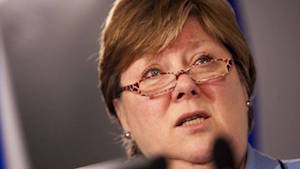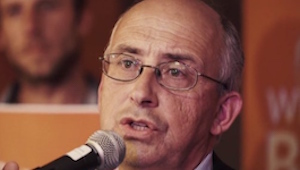12 Apr Maureen’s self-indulgent goodbye
Credit Maureen MacDonald with many things in her 18-year career as a member of the Nova Scotia Legislature. She gave voice to people not always audible in the halls of government: the poor and ill-housed, single parents and debt-weary students—all the working stiffs who ride inconvenient buses to ill-paying jobs.
 As Minister of Health tasked with stick-handling the NDP’s false promise to end emergency room closures, she pulled an unlikely rabbit out of the hat in the form of Better Care Sooner. The collaborative approach certainly didn’t end ER closures, but it improved access to overnight health care in remote and underpopulated parts of the province.
As Minister of Health tasked with stick-handling the NDP’s false promise to end emergency room closures, she pulled an unlikely rabbit out of the hat in the form of Better Care Sooner. The collaborative approach certainly didn’t end ER closures, but it improved access to overnight health care in remote and underpopulated parts of the province.
She saved Nova Scotians millions by reducing the cost of generic drugs. She had a steady hand and an eye focused on results.
Yet nothing in this otherwise admirable career so ill-became her as the spiteful manner of her departure from it. Everything about her announcement Tuesday was a carefully calculated snub to her party’s new leader, perhaps even a shrewdly disguised poison pill.
Gary Burrill received little or no notice of the announcement—even though the Liberals appeared to have been given a heads up. MacDonald insisted on being introduced not by Burrill or a currently sitting NDP MLA but by one of the paid staffers Burrill drummed out of party headquarters following his defeat of Dexter heir-apparent Dave Wilson. (Burrill cleaned house after MacDonald, the supposedly neutral interim leader, allowed party staff to campaign more or less openly for Wilson.)
Her short speech featured a gracious shout out to former Premier John Hamm but pointedly no mention of Burrill and no good wishes for the future of the party. The omissions were glaring and deliberate.
 Talking heads will spin MacDonald’s retirement as opening up a safe seat for Burrill to contest, but as a friend cautioned, what she opened may turn out to be a trap door.
Talking heads will spin MacDonald’s retirement as opening up a safe seat for Burrill to contest, but as a friend cautioned, what she opened may turn out to be a trap door.
The House of Assembly Act gives Stephen McNeil six months to call a by-election, which he can set a further six months off—one year from today in all. But he may decide to call it quickly, presenting the seatless party leader with a Hobson’s choice:
If Burrill fails to run for what has been a safe NDP seat, he will be faulted for fearing to face the voters. If he runs and loses—and it could be hard to win the seat without MacDonald’s active support—he will risk the fate of Helen MacDonald, who resigned her brief leadership after losing a by-election to one Cecil Clarke.
To the extent a winner is expected to embrace and comfort the losers of an intra-party battle, Burrill bears much responsibility for the ongoing hostility. He thrust aside all who played any role in the Dexter Government, appointing in their place exemplars of the party’s left, labour-dominated fringe. Most recently, he named as his communications director one Kyle Buott, a labour activist whose communications expertise consists mainly of quaint slogans from the class struggle shouted through a bullhorn.
The oddest thing about this approach is that it ignores the opportunity Stephen McNeil’s austerity-focused approach has opened for the NDP. Where Justin Trudeau has crowded the federal party by steering his young government to the left, McNeil has abandoned a vast open space on the moderate centre-left. It is territory Burrill seems determined not to occupy.
